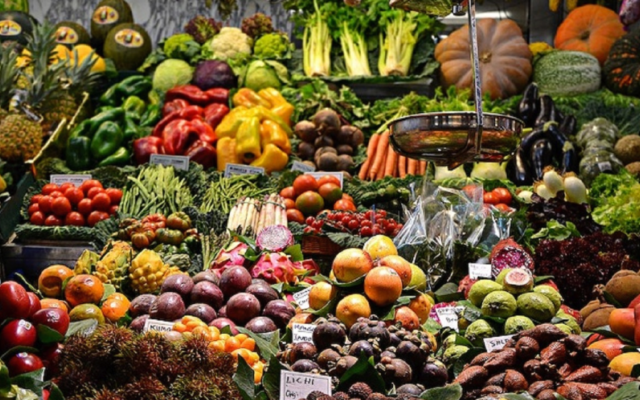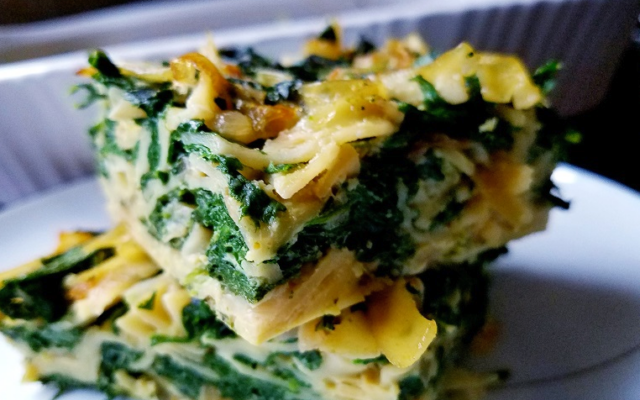Plant-Based Holiday Dishes Can be a Life Saver
The boom in plant-based eating is expected to create a market of more than $162 billion by 2030.

Eleven years ago, Dr. Neil Cooper, chief radiologist for Kaiser Permanente of Georgia, suffered a serious heart attack. He thought he was going to die.
“I fell to the ground with severe chest pain. I was rushed immediately to the catheter lab in the hospital where I was working. I’ve attended many, many emergencies like this in my career, and I knew my life could have ended, then. But fortunately, it did not happen to me.”
For Cooper, who was 56 at the time, the close brush with death was a wake-up call. Like many doctors, the pressures of taking care of others often left him with little time to think of himself, particularly when it came to what he was eating.
Prior to his heart attack, he says, he ate everything, with little understanding of the role our diet plays in our health.
Within five months, with the help of his wife, a certified health and wellness coach, he adopted a plant-based diet and was astonished by the results.

“Within those few months, all of my body chemistry numbers normalized. I needed to lose weight and I did, without even trying. My cholesterol went down to normal; I got off all of my medications and today I feel better today than I did 15 years ago.”
Cooper and his wife are just two of the many people in America who, over the last 20 years, have become vegetarians, swearing off all animal-based products, including dairy and living what they describe as a life that is healthier and more enjoyable.
According to recent statistics, in the last 10 years, those who have adopted vegetarian diets have increased 500 percent.
According to Bloomberg Intelligence Report, by 2030, plant-based food sales are expected to increase another 500 percent. The jump over the next seven years is expected to make the vegetarian market worth $162 billion.
According to Bloomberg Intelligence Report, by 2030, plant-based food sales are expected to increase another 500 percent. The jump over the next seven years is expected to make the vegetarian market worth $162 billion.
This week, Tyson Foods, the world’s second largest meat processor, announced it was closing four of its chicken plants. It closed two other poultry plants in May.
Earlier this year, for the first time, Tyson debuted a new line of plant-based meat substitutes under its own brand. The new products, initially, will be sold in Target stores, in addition to a new plant-based chicken by the company’s Raised and Rooted label.
As the Jewish High Holidays approach, more and more consumers are looking for plant-based products and dishes to add to their festive table.
Prior to the great Jewish migration from Eastern Europe in the late 19th and early 20th centuries, the Jewish diet was heavily plant based. Meat was an expensive luxury in many Jewish communities and rooted vegetables, beans, and lentils were the foundations of many diets. It was only after many came to America, where beef and chicken were cheap, that eating habits changed.
Today, as animal products rise in price, Jewish vegetarianism, which includes substantial amounts of plant-based proteins, is gaining in popularity. Dr. Cooper recommends www.jewishveg.com as a source for recipes and advice.
A groundbreaking Jewish vegetarian cookbook, “The Vilna Vegetarian,” first published in Yiddish in Lithuania in 1938, was translated in 2015. It came with a new introduction by food historian Joan Nathan and has become a collector’s item, with used copies selling for well over $100.
Jewish vegetarian delis like Ben and Esther’s in Portland, Ore., Sam and Gertie’s in Chicago, and Mort and Bettie’s in Los Angeles are part of an expanding restaurant scene in plant-based dishes. Almost half the restaurants in America have added vegetarian entrees.
It’s all music to the ears of Dr. Cooper, who has become a board-certified lifestyle medicine physician spreading the word about how veggies can save your life.
“I’ve seen tremendous changes in 21 days,” Cooper says. “People, for example, often come off their diabetic medications in three weeks. It’s a very powerful, new way of living.”

Dairy-free Spinach Noodle Kugel
One pound package of egg-less noodles
One pound package of frozen spinach, thawed and drained
2-3 tablespoons breadcrumbs combined with plant-based butter or margarine for the topping
Sauce
Two 16-ounce boxes of firm tofu, drained
1 cup unsweetened almond or soy milk
½ cup nutritional yeast
Juice of a large lemon
1 tablespoon granulated garlic
1 tablespoon granulated onion
salt and pepper (to taste)
Cook pasta until just chewy.
Combine the sauce ingredients in a blender until smooth.
Thaw and squeeze liquid from the frozen spinach.
Combine just enough sauce with the pasta to give it a smooth consistency.
Gently stir in the spinach.
Bake in a rectangular pan, that’s small enough to give the kugel some depth at 400 degrees for 15-20 minutes topped by the buttered breadcrumbs. Brown under the broiler.
- Holiday Flavors
- Community
- Bob Bahr
- Dr. Neil Cooper
- radiologist
- Kaiser Permanente of Georgia
- Heart Attack
- vegetarian diets
- plant-based
- Bloomberg Intelligence Report
- Tyson Foods
- Raised and Rooted
- The Vilna Vegetarian
- Joan Nathan
- Ben and Esther’s
- Sam and Gertie’s
- Mort and Bettie’s
- Dairy-free Spinach Noodle Kugel



comments